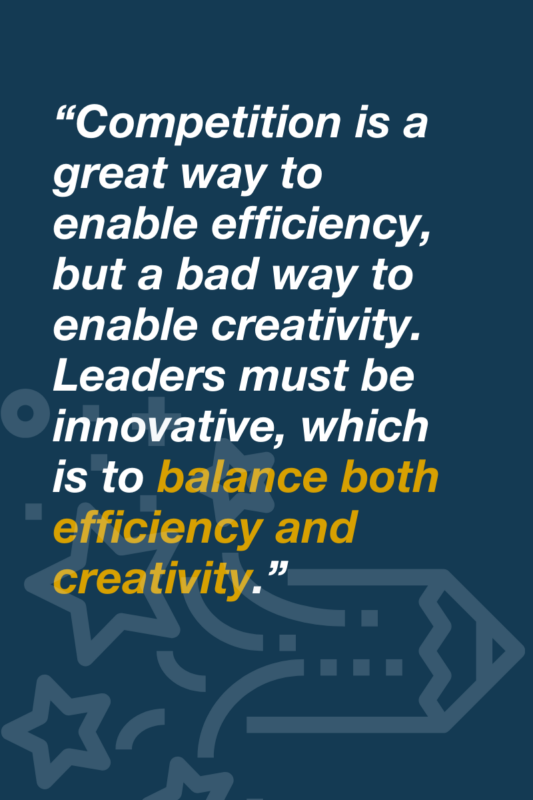Being Creative and Innovative at Work with Beau Lotto
In The Leadership Standard Podcast, Dr. Beau Lotto, a renowned neuroscientist, argues that comfort and predictability hinders our ability to discover innovative ideas—a crucial skill for business leaders.
Our brains seek to mitigate uncertainty. We develop technology designed specifically for that reason. Receiving alerts when your food is delivered or when someone reads your message adds predictability to our daily routines.
“We are subconsciously trying to make life as predictable as possible. As a consequence, when we face uncertainty, we aren’t ready for it, we aren’t ready to adapt. The best systems in nature are those that adapt.”
The Importance of Perception in Business
Beau Lotto states that expanding perception is necessary. Perception underpins everything it is to be an individual. Our perceptions guide our decisions: what to eat, where to vacation, and how to conduct ourselves as leaders.
Short-term business success relies on efficiency, with a focus on bottom-line results; leaders make day-to-day decisions to increase productivity, beat the competition, and improve customer perception and brand awareness. However, it becomes increasingly difficult to remain efficient as the world changes, which it inevitably will. To adapt, we cannot think linearly, purely intellectually, we must expand our perceptions and invoke creative ideas, says Beau.
Expanding our perception is essential for innovation to thrive because our perceptions are based on our past experiences. Our brains naturally leverage lived experiences when understanding current situations. Applying past solutions to current challenges is not an effective strategy for solving problems, as the world is different today than it was yesterday. Coming up with novel ideas is only possible when we look past our old experiences and expand our perceptions through play and constructive conflict.

Play in the Workplace
According to Beau, there’s only one instance when the brain seeks uncertainty, during play. When someone is in a playful state rather than stressed, their hormones are level and their minds flow freely. This state is optimal for learning, problem solving, and creativity. The antithesis is a state of fight or flight, where we become unconscious of our actions and often make mistakes.
We can see play’s benefit in the natural world. A lion cub instinctively wrestles with its mother to learn the necessary skills to hunt and survive. Because there is little risk of harm in such an environment, the lion cub learns and grows effortlessly. Similarly, a work environment instilled with trust, compassion, curiosity, and commitment allows for successful solutions and effortless growth.
“Play is the evolution solution, that’s why play evolved. It is a state of mind, it means having no intention.”
The reward for play is intrinsic. The enjoyment felt during playing makes you want to do it more often. It creates a desire to continue engaging in the activity and therefore continue learning and growing. This is different from external rewards like money and recognition, which only motivate people until the reward is received, and then they are quick to disengage.
People driven by extrinsic rewards won’t be of long-term or collective benefit to an organization, as they tend to be self-interested. A great leader acts to the benefit of the collective and creates a playful environment that allows employees to be creative at work where the rewards are intrinsic.

Conflict Perception in Business Management
Beau Lotto states that business leaders fail when they think they need to know the answer to every question. While this is an impossibility, the correct approach is to create an environment that enables others to find the answer, which comes down to how the leader manages conflict.
“The best leaders, in my view, create an environment where conflict is a beautiful thing. It might seem a contradiction, but the problem is not the conflict but how we enter conflict in the first place.”
Conflict comes with the preconceived notion that one party is trying to win or convince the other to see their point of view. However, we only learn when we move from one perception to another. If we tie our identity to our point of view, then to change or move we will have to doubt our whole sense of self.
The key to resolving and learning from conflict is to enter it with a question rather than an answer. If you enter with uncertainty, not to validate but instead to understand, you’ll be able to leverage everyone’s perspective without taking challenges personally.
When an understanding is reached between parties, the solution will be one of adaptability, as it involves multiple perspectives rather than just one. This has long-term benefits in grasping the fundamental principles of business, strategy, teamwork, and change, increasing your ability to see unforeseen circumstances.
“This needs to be embodied. Life is a practice. Like going to the gym, it needs to be exercised,” says Beau
Leadership Creativity and Innovation in Business
Beau’s idea of a good leader is based on how to lead others into uncertainty. To do so, they must become perceptually intelligent, better understand what they do, why they do it, and help others do the same.
He references an analogy that “a party is an extension of the host;” in the same way that an organization is an extension of its leader. Personalities and behaviors are contagious; if the host of a party is quiet and timid, the party will be subdued and quiet; if the host is loud and gregarious, the party will be loud and gregarious. A host essentially infects their party with their personality.
Like a party host, leaders’ personalities and behaviours are contagious within an organization. The most open businesses are led by the most open people. The most disciplined organizations are led by the most disciplined people. Depending on the goals of an organization, different leaders will be better suited for the job, but they all must follow basic principles and create the space for others to be creative and expand their perceptions as well.
Our perceptions are often based on the past, and while we may learn from our past mistakes, it’s important to remain adaptable in an ever-changing business landscape. To expand our perceptions, we must walk into uncertainty willingly, openly, and with humility. For more information about how to develop your leadership skills, visit our blog on Biological Thinking, or watch or listen (on Spotify and Apple) to the full podcast for more impactful insights from Beau Lotto.


